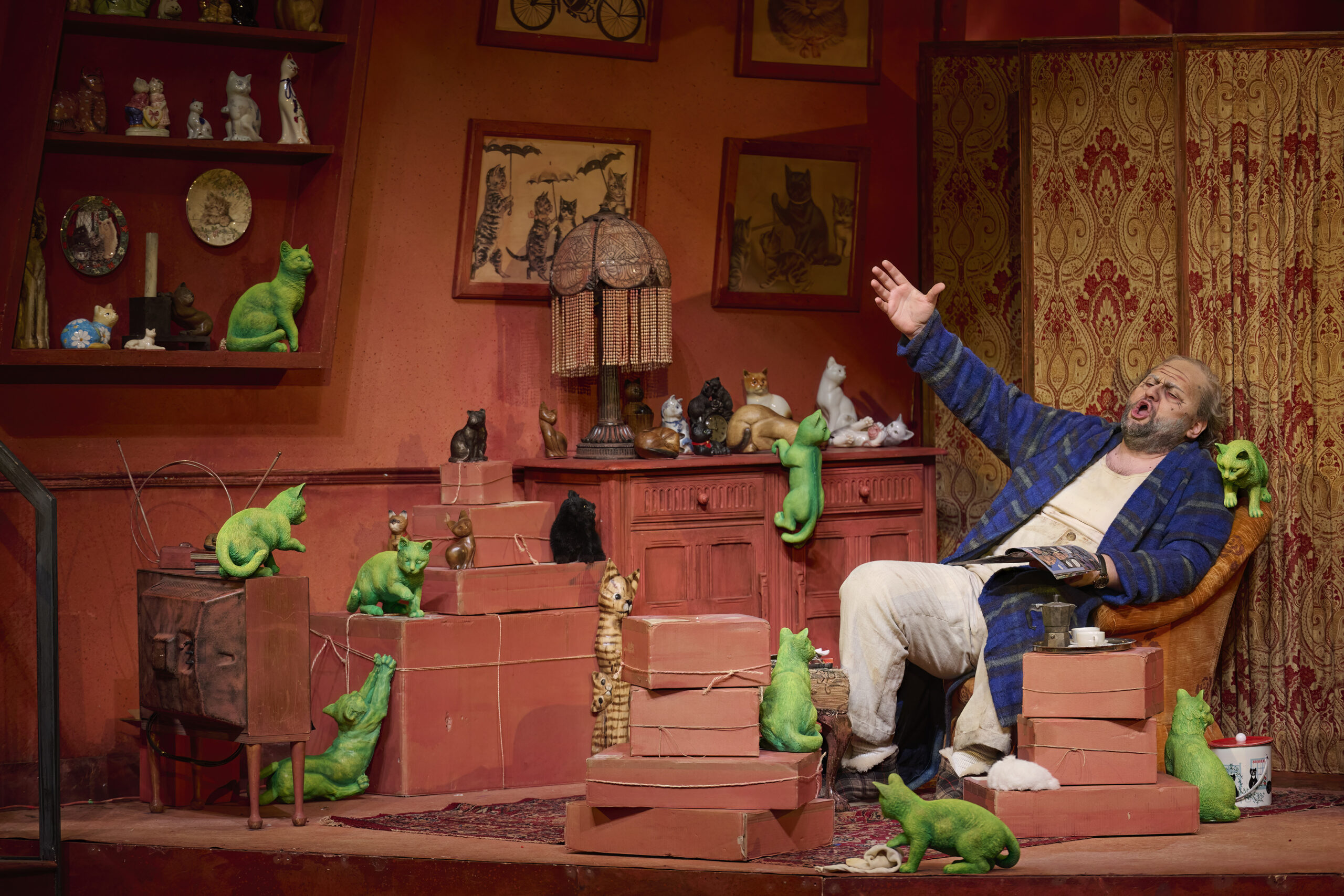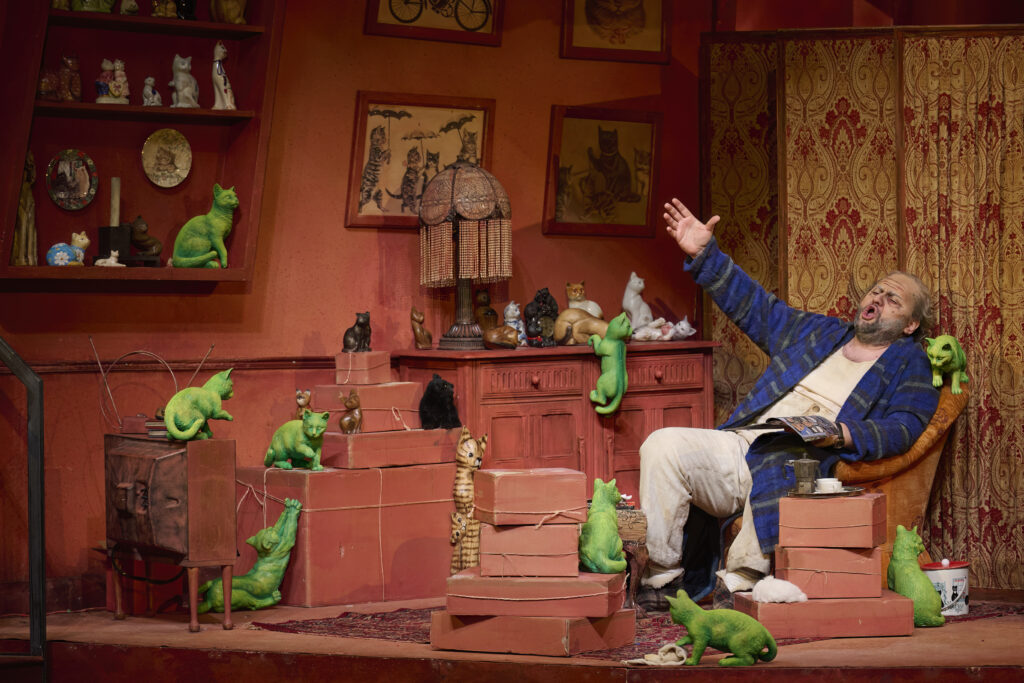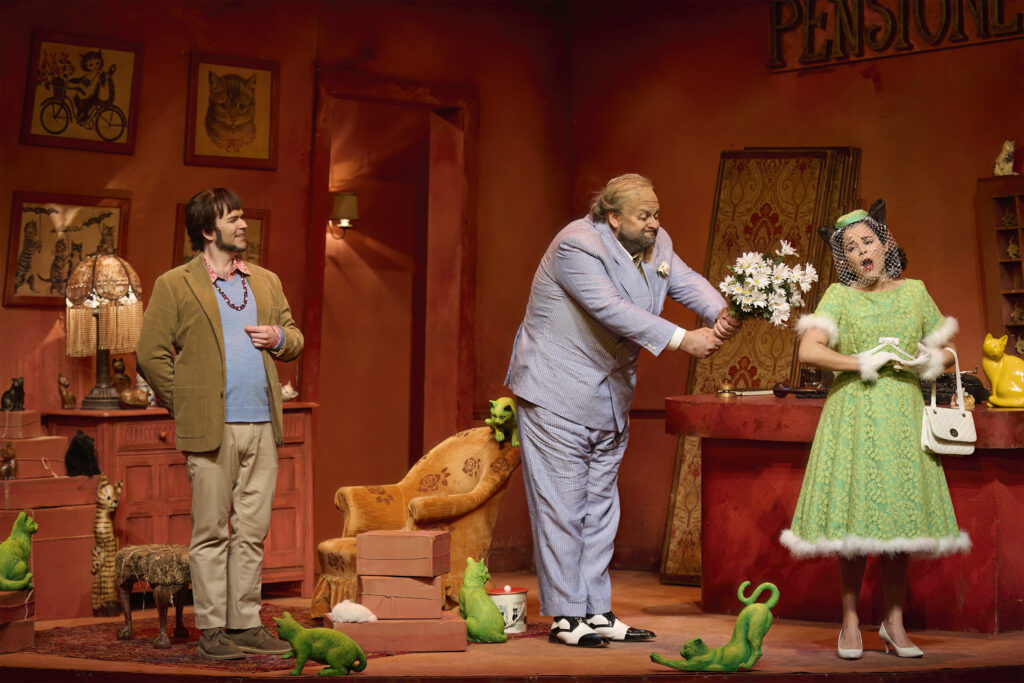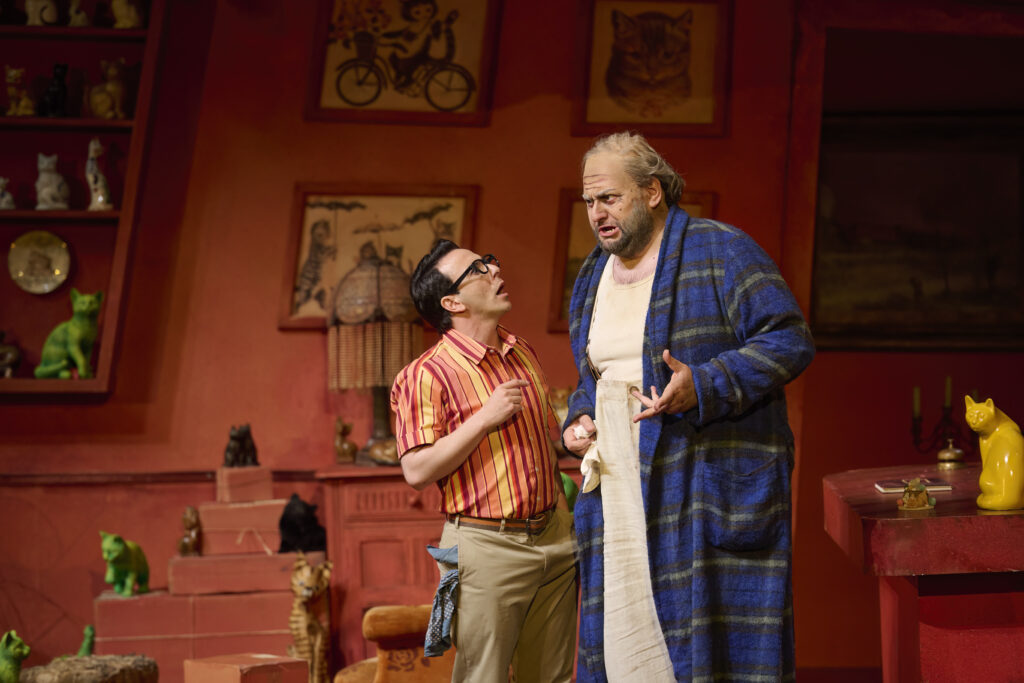

COC/Don Pasquale, composed by Gaetano Donizetti, directed by Barbe & Doucet, conducted by Jacques Lacombe, Four Seasons Centre. April/May 2024.
This production was an absolute delight. In fact, I don’t think I’ve ever seen a Don Pasquale that I haven’t enjoyed, but this version was particularly clever. In fact, this was opera buffa on steroids.
The internationally celebrated whiz kids behind this Don Pasquale, which was originally mounted for Scottish Opera in 2014, are based in Montreal. French-Canadian André Barbe is a set and costume designer, while French-born Renaud Doucet is a stage director and choreographer. Doucet came to Montreal in 1993 at the invitation of L’École Supérieure de Danse du Québec. The real-life couple joined forces in 2000, and have since set over 30 opera productions around the world. The combined forces of their many talents allowed them to be responsible for stage direction, dramaturgy, sets and costumes. The only thing left out was lighting and they roped in acclaimed fellow Montrealer Guy Simard for that particular duty.
The opera is set in Rome in 1965, where Don Pasquale (Georgian baritone Misha Kiria) owns the low-market Pensione Pasquale which he leaves to the charge of his nephew Ernesto (Argentinian tenor Santiago Ballerini). Prior to the opening of the opera, the two quarreled because Ernesto wants to marry the poor widow Norina (Canadian soprano Simone Osborne) while his uncle is intent on a rich wife for him. With the help of family friend Dr. Malatesta (Canadian baritone Joshua Hopkins), a plot is put in place where Don Pasquale will marry the doctor’s sister Sofronia (in reality Norina), who will become the wife from hell. A chastened Don Pasquale then allows the two lovers to marry.
Right from the start, audiences were treated to the brilliance of Barbe & Doucet. During the overture, the duo projected a “photoromanzo” which is like a comic book, with photos replacing the graphics. The pictures illustrated Ernesto meeting Norina and their falling in love, and Don Pasquale’s allergy to cats. His love of cats is represented by a gazillion green cat statues in his private quarters in lieu of a real pet. Barbe & Doucet also did their own surtitles which were very witty indeed.
The set was awash in clotheslines filled with sheets surrounding the hotel, but when the directors wanted to put the action to front of stage, the upper clotheslines descended to cover up the hotel lobby and Don Pasquale’s room. There was also an upper deck which functioned as a bar/café, which was accessed by a curved staircase to the side of the pensione.
The costumes were brilliant. Every member of the chorus had a different outfit representing either a tourist or a denizen of Rome (as denoted by occupation). The directors also layered in three non-singing actors as Don Pasquale’s questionable staff which added to the humour. In their directors’ note, Barbe & Doucet called them “a rum bunch”, and they certainly were that – a chain-smoking chambermaid (Colleen Winton), a greasy cook (Matthew Romantini), and an ancient porter (Thomas Jones) – all of whom projected strong personalities on stage.

Photo by Michael Cooper.
The cast was uniformly strong.
Kiria’s Don Pasquale was perfection. At first you see him in his own room looking absolutely slovenly in an undershirt, pants, and a ratty bathrobe. When he cleaned himself up to meet Sofronia, Kiria sported a smart light blue suit, Panama hat and two-tone shoes like a real Roman dandy. The singer is gifted with the booming and slippery voice that a baritone needs to wrap his tongue around the standard opera buffa patter songs which Kiria did with astonishing ease, and in as much as Montreal-born conductor Jacques Lacombe set a frenetic speed to the patter, Kiria had a big challenge to meet vocally-speaking. The talented Kiria commanded the action in both singing and acting whenever he was on stage.
Osborne is the quintessential coloratura soprano who can toss off the trills and runs needed in bel canto, but can also show more power when needed when she had to sing the more lyric soprano passages. Hers is a very pretty voice. The directors had Osborne cleverly adopt cat-like mannerisms to make her Sofronia more enticing to Don Pasquale which was quite adorable. Osborne is blessed with a bubbly stage personality, which she played to the hilt. Her gazillion costume changes were also brilliant. – demure, flashy and casual, the latter being Sixties pedal pushers.
Hopkins’ Dr. Malatesta (wearing love beads) was a baritone of a different colour – smooth, honey-coated and velvety. It is a very, very attractive voice indeed, most alluring, in fact. Ballerini was saddled with the thankless role of Ernesto, who is in a perpetual state of whine throughout the opera. I sensed a bit of strain at the top, but he does have the requisite Italianate sob in his pleasant tenor.
As Don Pasquale falls into the Donizetti and bel canto school, it contains tuneful melody, after tuneful melody, which Maestro Lacombe conducted with unabashed lyricism. As mentioned before, he was also fast and furious when it came to the patter songs.
In retrospect, it was the Montreal creative mafia who brought this charming and innovative Don Pasquale to the stage, and long may they reign – Barbe & Doucet, Simard and Lacombe. So when will the directors do an original production for the COC?
And just one final question. Did the COC deliberately hire short singers for this production because Kiria literally towered over everyone. He must be among the biggest guys in opera in both girth and height, which also made for very funny contrasts with his much shorter fellows.

